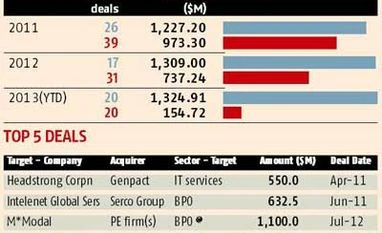According to the merger and acquisition data by Venture Intelligence for 2013 (year to date), inbound activity has surpassed outbound activity (excluding e-commerce deals). Total investment in Indian assets by private equity (PE) investors and strategic players has touched $1.32 billion, compared to $154.7 million spent by Indian firms to invest in assets outside the country. The sector saw 20 deals both in outbound and inbound. Among the macro-economic reasons, investors are looking for risk-free sectors, says Amit Singh, executive director, head (technology and outsourcing investment banking) at Avendus Capital.
"PE players who have set up funds dedicated to India are in a dilemma on when and where to invest. Add to this, an uncertain economic environment has impacted the rupee and also partly clouded political environment. They are hence looking at investing in companies and sectors with export orientation with less import component. IT/ITeS, and to some extent pharma and mining (though it has regulatory challenges) are the only industry that fit into this," Singh explains.
Baring Private Equity Asia's investment in Hexaware Technologies is a case in point. Also, the financial metrics of this sector are superior than many others. Singh says there are a few industries that can boast of Ebidta (earnings before interest, depreciation, taxes and amortisation) to cash ratio of over 50 per cent and return on investment and return on capital (pre-tax) of over 20 per cent.
Samiron Ghoshal, partner and IT advisory leader at Ernst & Young, explains investors have been looking at Indian assets for three reasons. First, when companies are looking to scale and assets that have niche capabilities. Finally, foreign companies are looking at assets that have business across regions, but have back-end in India. "We see activity in all the three areas. India's technology sector is undergoing a shift. The 1990s was all about body shopping kind of work, Y2K (year 2000) and the period after that saw players beefing up their offshoring presence. The next five years will be about a handful of companies emerging and becoming big players in niche segment," added Ghoshal.
After the IT and ITeS companies, technology start-ups in India, especially those focused on the enterprise segment, have also started to see deal traction. Although the e-commerce story has managed to capture the interest of venture capitalists, start-ups providing technology in the enterprise segment have also managed to get funding.
Sandeep Singhal, co-founder of Nexus Venture Partners, agrees that foreign investors are looking at Indian technology companies both from an investment and M&A perspective although the activity is still significantly lower than the US or Israel. "The IT space grown in recent years on the back of mid- to senior- level engineers leaving global development centres to start companies, either alone or in partnership with colleagues from the US. There has also been some transition of founders from the US to India, but it has been less of a factor," he added. Most of the outsourcing by multinational companies in India is around either infrastructure technologies (operating system, storage, networking, security, cloud) or around productivity applications, such as enterprise resource planning or ERP, and since this is the source of start-up talent, it is natural to see companies in these spaces.
"We see traction in either niche space like cloud and analytics, or even in traditional areas like generic BPO (business process outsourcing) and IT services. Even in a traditional area like call centres, nearly two-third of the business is done in-house. Hence, significant headroom for growth exists in these areas," said Singh. For some sectors, there's no such thing as a slowdown.
)